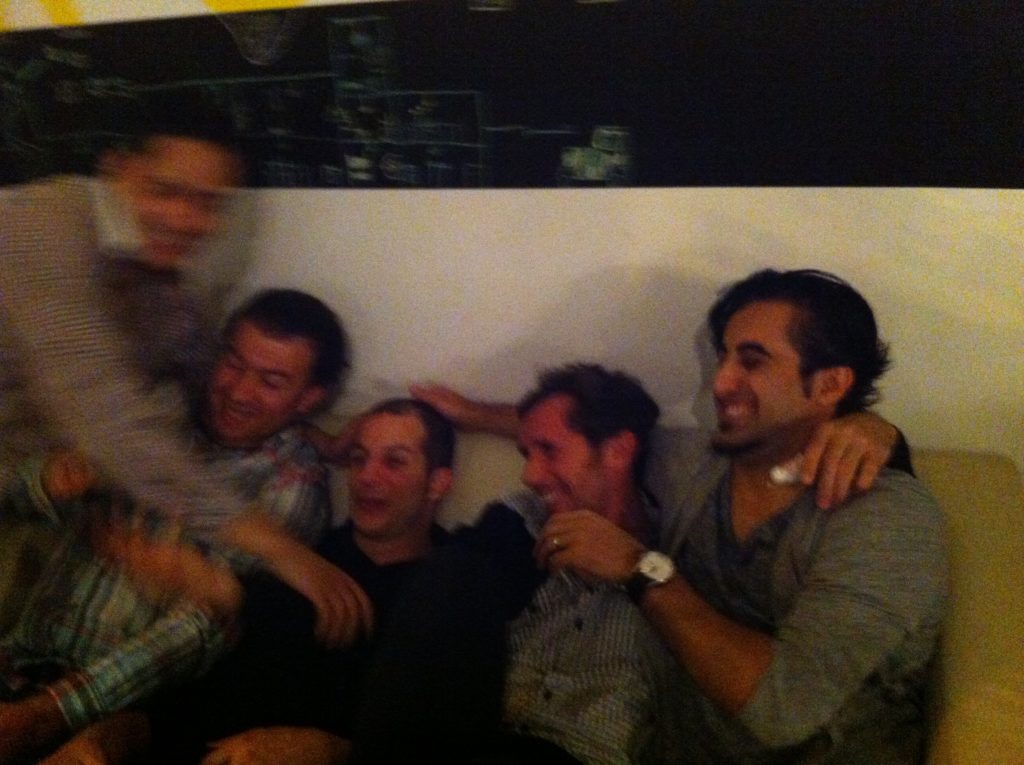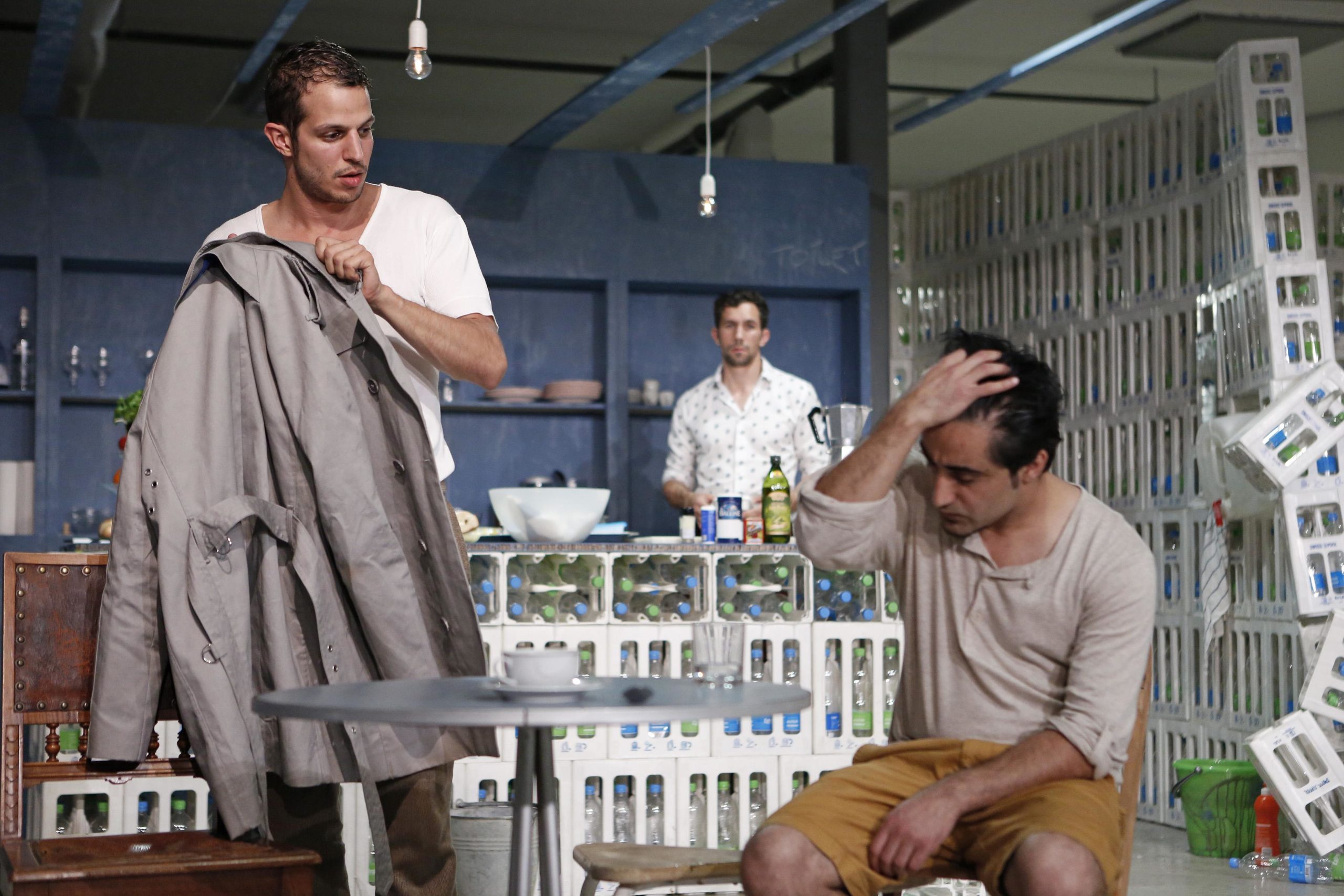In front of the sound-scenery of passing by trains five men meet coincidently at a sandwich bar in nowhere land. They fell out of time; all are on their way through. Out of hesitance the men drive from an inner monologue to conversation. They talk about their emergence, lost, hindrance, from the frontiers that restrict their life and their struggle for chance! For this short time the sandwich bar becomes their centre of the world. What unites them is the immigration from a village to a city, from one country to another, by choice or force. It is a fundamental experience of our time – stories that are heavy to sustain but their self-claim is their little refugee.
Details of ‘Sons’ (‘Söhne)
Five men, sons, travelling on different paths meet in a railway station bar. Trains speed by in the background. One man works behind the bar; the second waits forlorn for a woman, holding a bunch of flowers in his hand; the third is continuously interrupted by his mobile phone; two musicians are lost playing music between crates of bottles and a fridge. The men have nothing in common and would remain strangers to each other if they didn’t enter into conversation. This timeless location is for a short time the centre of their world.
In the brief encounter an almost somnambulistic depth of conversation develops; like in a train, sitting beside someone, talking about private, intimate, even difficult matters before suddenly having to disembark. Until then, there is time. They listen intently, even when it is not clear if they speak to each other or to themselves. They see each other but don’t seem to judge what is being said; there is no nodding of the head, no showing of involvement. Here one word doesn’t seem to lead to another. It ia hard to make out which impulse brings the men to speak or to play music; sometimes in unison, sometimes diverging. Obstacles, losses, hindrances, departures, corners and edges colour their lives. They search, ask, set questions which affect us all but which we never ask, except in a hidden way, hiding perhaps from ourselves.
The actors and musicians in ‘Sons’ all grew up in the contemporary hybrid culture mix; their authenticity and originality lie in the wide variety of experiences they had together, to search for theatrical expression. ‘Sons’ tells of the edges, the wounds, the joy and despair of identity conflicts and self development processes; being secretive without quickly attaching blame, without clichees, without appraisals, judgements or condemnations; in delicate and patient debate, through bographical research, collected stories and suitably composed music, as a genuine expression, giving birth to a theatre evening which, through artistic methods, mirrors the social reality and variety in modern urban life.
Cast
Direction & Text: Anina Jendreyko
Play: (Jean) Nadim Jarrar, (Stani) Robert Baranowski, (Memo) Orhan Müstak Music: Haki Kilic, Delchad Ahmad
Set design: Pia Gehriger
Prop: Özlem Yilmaz
Costumes: Cornelia Peter
Production management: Pascal Moor, Assistant director: Marie Jeger
Press
….with her play „Sons“ the actress and theatre directress in Basel, Anina Jendreyko, succeeds in showing a subtle and dramatic stage presentation, which leads our view behind crumbling definitions of culture and migrations… Memo explodes in a scene which could write theatre history when he fights with a cieling lamp, but he must take as well as it is in life….
Annette Mahro, Badische Zeitung 30.Mai 2014-06-11
…..Much more than cultural rooted traditions we see the experiences and formative influences by ancestors and parents. It tells about passions and love and the big questions of life, which have no origin in nationality. To listen to these men, whose stories suddenly touch and overlap each other, makes the world perceptible as a permanently changing creation out of dreams, history and fiction…..
Kaa Linder, SFR/Swiss Television and Radio Station – Kultur 3. Juni 2014
Anything we saw and heard provokes an anxiety about people, about being human. Everything is simple Everything is sincere Humans .The text. The stage setting. The music: The music gives big warmth,depth, the wailing, the love, the nevertheless. The three main characters excellent. In the first moment everthing is there which unfolds later. Three excellents moments: the barkeeper, there forever, in the center,– -the writer, hoping and searching in vain—the oldest in his family asking fort the effects of what he does. Three people, three questions known to everybody, questions which often remain unspoken, mostly hidden, specially from ones self….. …Anina Jendreyko looks into the life of a whole generation of our time. The definition of these stories, the text and the creative playing, a play of three actors, strong and clear, the words straightforward, and the text tight, having something to say, beautiful, wise and non pretentious……
Bodo von Plato 6. June 2014





